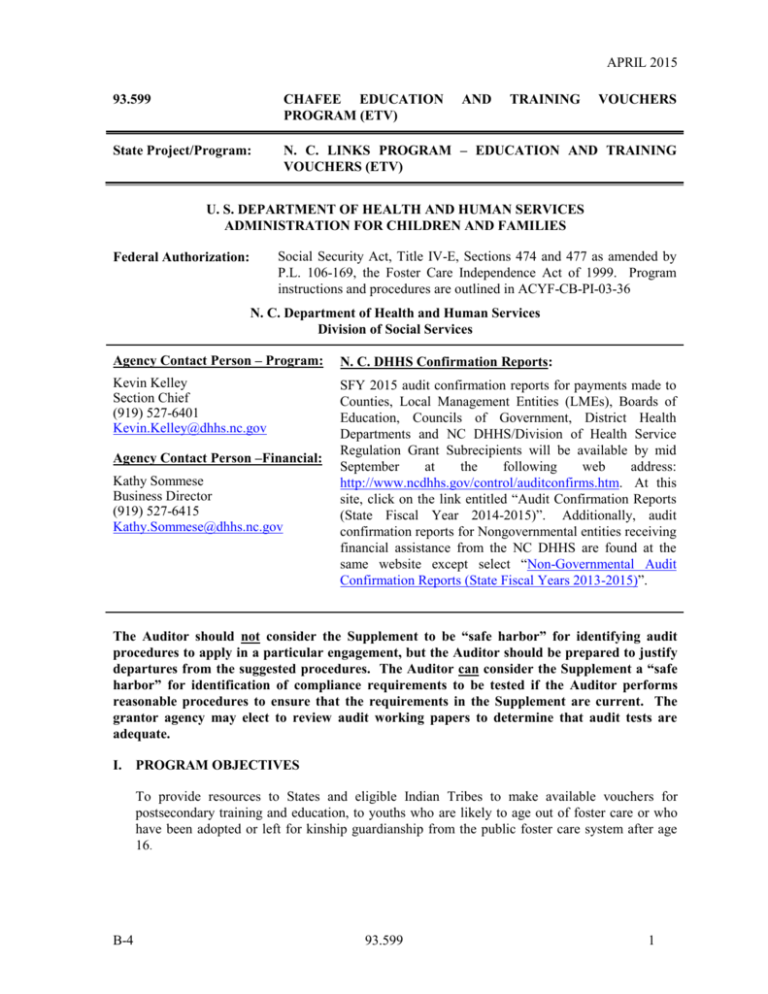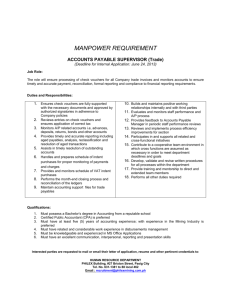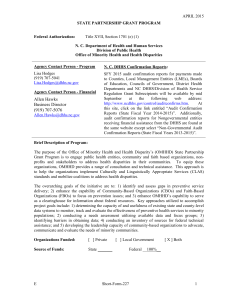G. Matching, Level of Effort, Earmarking
advertisement

APRIL 2015 93.599 CHAFEE EDUCATION PROGRAM (ETV) AND TRAINING VOUCHERS State Project/Program: N. C. LINKS PROGRAM – EDUCATION AND TRAINING VOUCHERS (ETV) U. S. DEPARTMENT OF HEALTH AND HUMAN SERVICES ADMINISTRATION FOR CHILDREN AND FAMILIES Social Security Act, Title IV-E, Sections 474 and 477 as amended by P.L. 106-169, the Foster Care Independence Act of 1999. Program instructions and procedures are outlined in ACYF-CB-PI-03-36 Federal Authorization: N. C. Department of Health and Human Services Division of Social Services Agency Contact Person – Program: N. C. DHHS Confirmation Reports: Kevin Kelley Section Chief (919) 527-6401 Kevin.Kelley@dhhs.nc.gov SFY 2015 audit confirmation reports for payments made to Counties, Local Management Entities (LMEs), Boards of Education, Councils of Government, District Health Departments and NC DHHS/Division of Health Service Regulation Grant Subrecipients will be available by mid September at the following web address: http://www.ncdhhs.gov/control/auditconfirms.htm. At this site, click on the link entitled “Audit Confirmation Reports (State Fiscal Year 2014-2015)”. Additionally, audit confirmation reports for Nongovernmental entities receiving financial assistance from the NC DHHS are found at the same website except select “Non-Governmental Audit Confirmation Reports (State Fiscal Years 2013-2015)”. Agency Contact Person –Financial: Kathy Sommese Business Director (919) 527-6415 Kathy.Sommese@dhhs.nc.gov The Auditor should not consider the Supplement to be “safe harbor” for identifying audit procedures to apply in a particular engagement, but the Auditor should be prepared to justify departures from the suggested procedures. The Auditor can consider the Supplement a “safe harbor” for identification of compliance requirements to be tested if the Auditor performs reasonable procedures to ensure that the requirements in the Supplement are current. The grantor agency may elect to review audit working papers to determine that audit tests are adequate. I. PROGRAM OBJECTIVES To provide resources to States and eligible Indian Tribes to make available vouchers for postsecondary training and education, to youths who are likely to age out of foster care or who have been adopted or left for kinship guardianship from the public foster care system after age 16. B-4 93.599 1 N. C. LINKS PROGRAM – EDUCATION AND TRAINING VOUCHERS (ETV) II. PROGRAM PROCEDURES The State completes the annual CFS-101 that provides an estimate of annual funds. The Administration of Children and Families (ACF) awards funds to states depending upon funding availability. These funds require a twenty-percent match which may consist of State funds or allowable in-kind match. Subrecipients submit an annual contract proposal to the State and funds are awarded. Subrecipients acquire their grant award via the N. C. DHHS Office of Procurement and Contracting procedures referenced at http://coe.dhhs.state.nc.us/. Funds are distributed to the subrecipient on a monthly basis upon submission of a DSS-1571 invoice to the State. Eligible youth are required to apply for funding by completing the subrecipient application on line. Eligibility is determined by the NC State LINKS Program and communicated to the subrecipient. Funds are distributed to eligible applicants depending upon need and funding availability up to $5,000 per year and upon verification of their enrollment in a postsecondary or vocational institution. Funds may used for cost of attendance and other allowable expenses. Subrecipients are monitored by the NC State LINKS Program in accordance to the N. C. Division of Social Services (DSS) Monitoring Plan, found at: http://ncdhhs.gov/dss/Monitoring/index.html. III. COMPLIANCE REQUIREMENTS Crosscutting Requirements: The compliance requirements in the Division of Social Services “Crosscutting Requirements” in Section D (Supplement #DSS-0) are applicable to this grant. A. ACTIVITIES ALLOWED OR UNALLOWED Funds may be used to provide vouchers for postsecondary education and training to youth who are/were in foster at age 17 otherwise eligible for services under the State’s or Tribe’s Chafee Foster Care Independence Program. Vouchers may also be provided to youth who leave foster care for adoption or kinship guardianship after age 16. Vouchers can be provided to youth up to the age of 23, as long as they are participating in the program at age 21 and are making satisfactory progress toward completing their course of study or training. Vouchers provided to individuals may be available for the cost of attending an institution of higher education (as defined in section 472 of the Higher Education Act) and shall not exceed the lesser of $5,000 per grant year or the total cost of attendance as defined in section 472 of the Higher Education Act. No more than ten percent (10%) of the federal grant is dedicated to the administration of these funds. That portion of the funds is distributed between salaries and other administrative costs. The remainder of the funds may only be used for cash vouchers for the eligible students to pay for allowable expenses that are included in their cost of attendance. Vouchers are directly paid to third party vendors. Recommended Audit Procedures: Determine that students receiving Educational Training Vouchers are eligible for these funds by meeting all the criteria in section B, below; B-4 93.599 2 N. C. LINKS PROGRAM – EDUCATION AND TRAINING VOUCHERS (ETV) Documentation of vouchers from Foster Care to Success specifies that the student is eligible for ETV and that any expenditure is allowable under the principles of the Act. Documentation of administrative expenditures from Foster Care to Success is allowable under the budget. B. ALLOWABLE COSTS/COST PRINCIPLES Funds provided to the subrecipient for administration may only be used for salaries, annual audit expenses, web-based application, case management services; mentoring services; marketing and promotional materials, insurance, equipment, supplies. Funds provided to or on behalf of applicants may be used for: Tuition and fees On-campus room and board or a housing and food allowance for off-campus students; Allowances for books, supplies, transportation, loan fees, and, if applicable dependent care; Costs related to a disability; Miscellaneous expenses, including rental or purchase of a personal computer; Reasonable costs associated with eligible study-abroad programs. All grantees that expend State funds (including federal funds passed through the N. C. Department of Health and Human Services) are required to comply with the cost principles described in the N. C. Administrative Code at 09 NCAC 03M .0201. E. ELIGIBILITY Applicants are eligible for up to $5,000 in financial assistance to attend a qualifying educational or vocational training institution which provides post secondary coursework. The award is based on the total cost of attendance less other federal grants and scholarships. The award may not exceed $5,000. Applicant is now between 18 and 20 years of age. If now 21 to 23 years of age, must have received ETV funds prior to 21st birthday and; Applicant was in foster care on or after his/her 17th birthday or was adopted from foster care on or after his/her 16th birthday or placed in a relative guardianship on or after his/her 16th birthday and; Applicant is attending a qualifying institution of post-secondary learning. Full time students qualify for up to $5,000 a year for all the above expenses; students attending part time qualify for up to $2,500 per year in tuition/fees, books, supplies, transportation and dependent-care expenses and; The applicant is either a U. S. Citizen or is a qualified resident alien. G. MATCHING, LEVEL OF EFFORT, EARMARKING There are no county matching requirements. The State is responsible for certifying a 20% in-kind match for the grant by documenting that the required amount was spent on the State portion of the foster care board rate on behalf of applicants participating in Contractual Agreements for Residential Services (CARS) while attending school. B-4 93.599 3 N. C. LINKS PROGRAM – EDUCATION AND TRAINING VOUCHERS (ETV) H. PERIOD OF AVAILABILITY OF FEDERAL FUNDS Federal grants are provided to the State for the Federal Fiscal Year October 1 through September 30. Funds are awarded to subrecipients on a State Fiscal Year July 1 through June 30. I. PROCUREMENT AND SUSPENSION AND DEBARMENT All grantees that expend federal funds (received either directly from a federal agency or passed through the N. C. Department of Health and Human Services) are required to conform to federal agency codifications of the grants management common rule accessible on the Internet at http://www.whitehouse.gov/omb/. All grantees that expend State funds (including federal funds passed through the N. C. Department of Health and Human Services) are required to comply with the procurement standards described in the North Carolina General Statutes and the North Carolina Administrative Code, which are identified in the State of North Carolina Agency Purchasing Manual accessible on the Internet at http://www.doa.state.nc.us/PandC/agpurman.htm#P6_65. Nongovernmental subrecipients shall maintain written Procurement policies that are followed in procuring the goods and services required to administer the program. L. REPORTING This program is required to submit an annual CFS-101 report and form SF-425 to the Administration of Children and Families (ACF). M. SUBRECIPIENT MONITORING Subrecipients are monitored by the NC State LINKS Program in accordance to the NC Division of Social Services (DSS) Monitoring Plan, found at: http://ncdhhs.gov/dss/Monitoring/index.html B-4 93.599 4





